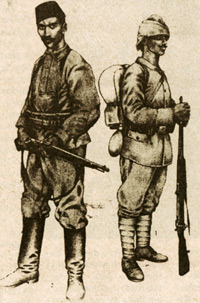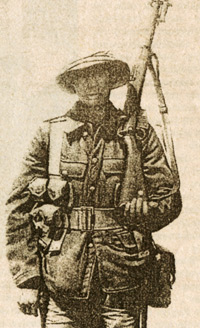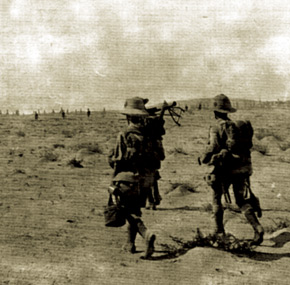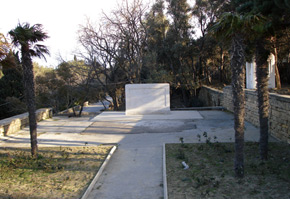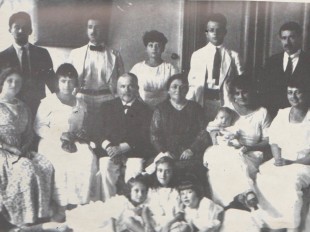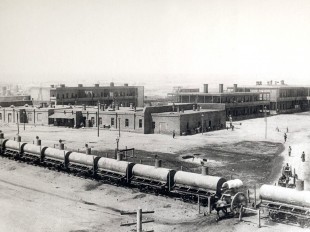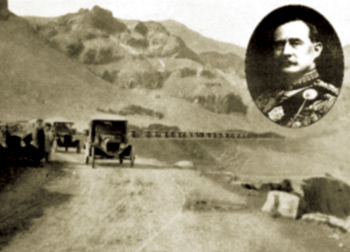 Maj.Gen. Lionel Dunsterville (inset) British Dunsterforce troops on route to Enzeli through the mountains of then-Persia in July 1918. (Photos courtesy Imperial War Museum, Angus Hay)
Maj.Gen. Lionel Dunsterville (inset) British Dunsterforce troops on route to Enzeli through the mountains of then-Persia in July 1918. (Photos courtesy Imperial War Museum, Angus Hay) by Prof. Musa Qasimly
Britain’s policy towards the Caucasus and Azerbaijan during World War I makes an interesting page in the history of international relations. Soviet historiography branded as imperialist aggression and occupation the expedition to Azerbaijan of British and Allied forces led by Gen Dunsterville towards the end of the war and the later expedition led by Gen Thomson. The inappropriate use of ideology has often left the real context of historical events in the background. But now artificial obstacles to researching true history have been removed and there is a real opportunity to learn history as it is.
Russian Revolution
What were the aims and objectives of Britain’s policy towards Azerbaijan from September 1917 to September 1918? It’s a complicated question, so this article will consider just some aspects of the policy, based on British, Azerbaijani and Turkish archive material.In 1917 the Great Powers, including Great Britain, embarked on a new stage in their policy towards Azerbaijan. First of all, let us review the factors underlining British policy in Azerbaijan.
The February Revolution in Russia had caused the collapse of the Russian Empire, changing the socio-political situation in the country. The Provisional Government became the only legitimate authority. The Soviets (Bolsheviks) were also functioning, but lacked power and influence. In the remote regions, including in Azerbaijan, the authority of the newly established National Councils was increasing. The majority of Azerbaijani Turks in Azerbaijan recognised the bodies of the legitimate government and were firmly united around the National Council*.
After the coup in St Petersburg during the night of 24 to 25 October Bolshevik Russia turned into an enemy for the former allies of the Tsar’s government. The Bolsheviks said they had started a "world communist revolution" and showed the world’s starving, war-weary people an example of how to get rid of war. Although Bolshevik ideas did not have much impact on the South Caucasus, they began spreading rapidly in Europe. Slogans such as equality, brotherhood and freedom were of course having a revolutionary effect on British colonies. Winston Churchill, the great British statesman, noted that the monkey Bolsheviks would soon turn Russia into a wilderness. Bolshevism should be strangled in its cradle.
The main risk was in the East. British interests had to be protected in Iran and in the Indian Ocean. Gen Lionel Dunsterville, head of the first British mission in Baku, later admitted that if the British had not occupied Baku and Iran, then Bolshevism would have covered Southern Azerbaijan. The rest of Iran would have joined the people of Turkistan and the whole of Central Asia and Afghanistan would have been involved in this turmoil.
Oil
From 1916 the oil and fuel factor began to play a key role in military operations. And it was found that whoever possesses more energy resources and the ability to use of them is closer to victory. After the collapse of the Russian Empire, the Great Powers were striving to access the important energy resource of Baku, Azerbaijan, which had enormous economic potential. At that time Baku was producing 83 per cent of the oil extracted in Russia.British oil magnates were particularly interested in the oil industry of Baku and saw it as a magnificent prize. The British journal Near East noted in 1918, "Baku has no equal in terms of oil in the world. Baku is the biggest oil centre the world over. If oil is a kingdom, then Baku is its crown." Lord Curzon (1859-1925), Foreign Secretary, was one of the supporters of the capture of Baku.
Location
The British were not only interested in the mineral resources of Azerbaijan. Azerbaijan’s geo-strategic importance was at the Entente’s centre of attention too. In 1917 the Trans-Caucasus, 190,000 square kilometers in area, bordered on Iran, the Ottoman Empire and Russia. All the harbours in this territory, such as Baku, Batumi, Sukhumi and Poti, were of great political and strategic importance. But Southern and Northern Azerbaijan together made up 200,500 square kilometers, more than the whole Trans-Caucasus. To capture Azerbaijan meant to own the bridge between Europe and the East. The trade routes of Baku-Novorossiysk and Baku-Batumi, as well as Tabriz-Bursa-Istanbul, were not only of economic but also of military-political importance. This is why control over Baku and the Caspian Sea was one of the priorities of British foreign policy. In June 1918 Alfred Milner, British Minister of War, noted in a report to the British command in Mesopotamia that His Majesty’s government paid special attention to permanent control over the Caspian Sea. Gen Dunsterville also noted that control over the Caspian Sea could be achieved only by the capture of Baku. For this reason the city had to be defended from enemies.On 29 September The Times commented that the Caspian Sea fell within British interests. That is why Gen Dunsterville and Gen Malleson were given an order to occupy the harbours of Enzeli, Baku and Krasnovodsk. The armies in the Caucasus and Turkmenistan had to maintain contact with Gen Denikin’s anti-Bolshevik White army in the Northern Caucasus, and in the Urals with Admiral Kolchak in order to separate the southern territories from Russia.
Bolsheviks dominate Baku
In autumn 1917 the situation in the South Caucasus worsened and confrontations on class as well as ethnic grounds began gradually to increase. The activity of the Trans-Caucasus Special Committee**, which had been established after the February Revolution, had ended. In terms of administration and politics the South Caucasus’s links with Russia had visibly weakened. Under this circumstance the establishment of a new government in the South Caucasus was becoming unavoidable. The Bolsheviks occupied Baku on 2 November and chose this moment to form the Baku Soviet, a new government led by Stepan Shaumyan. After that the whole South Caucasus was at risk of falling under the influence of the Bolsheviks. Since the activity of the Bolsheviks contradicted the interests of the Entente states, they also began to move. In fact, the establishment of the Baku Soviet directly contradicted the interests of the Azerbaijani people. Though the Musavat Party won 40 percent of votes in elections to the Soviet, it refused to join the Soviet as it was hostile to national interests. The Musavat Party and the British shared a common attitude towards the Baku Soviet.South Caucasus peoples set up commissariat, Russia withdraws from WWI
Meanwhile, in November in Tbilisi, British, French and US representatives gave their blessing to Menshevik Yevgeniy Gegechkori as he established the Trans-Caucasus Commissariat.*** The Commissariat included those who had been advised by the representatives of the diplomatic missions of Great Britain, France and the USA. It also included four Azerbaijani representatives. Soon, on 2 December 1917, Soviet Russia concluded the Brest-Litovsk Treaty with the Central Powers and then signed the Erzinjan agreement on 15 December and left the war. As a result, the frontline from Hamadan to the Baltic Sea fell quiet.Britain seeks to push back Ottoman, Bolshevik influence
The promotion of German and Ottoman influence in the South Caucasus and the ongoing events made the Allied states, particularly Britain, anxious. On 3 December on the initiative of the USA the Entente states held a special conference. Under the resolution adopted at the conference Great Britain had to occupy Central Asia and the Caucasus. Great Britain was also entitled to stop the Bolshevik epidemic and Turkish advance. With these rights the British were thinking of implementing their plans after repulsing the Bolsheviks in the north and the Turks in the south of the Caucasus and the Caspian Sea, thus stopping the potential danger coming from the north of Iran. For this purpose they wanted to prevent both Turkish expeditions and the spread of Bolshevik influence to Central Asia and further to the Indian subcontinent.Lord Curzon thought that there was a need to help the Caucasian people fight Bolshevism, to unite them around the goal of pushing the Bolsheviks back. He thought that in the future these people would think well of England. A 1922 Foreign Office report on events from 1917 to 1921 in the South Caucasus noted that since the second half of 1917 the British government had directly supported the South Caucasus national movement. The document noted that a delegation that included the representatives of the Caucasian nationalists had even met the British ambassador in Tehran. The delegation asked for support from the UK. Financial aid was promised and special bank accounts were opened in Hamadan and Tbilisi.
At the end of December 1917 and in early January 1918 British officials began to make statements on building relations with the Caucasus government and helping patriotic forces in Russia. British Prime Minister Lloyd George made statements about this on 14 and 20 December and on 5 January 1918.
On 22 December Lord Cecil, deputy British foreign secretary, and Lord Milner, minister of war, headed for Paris to take part in a meeting of the Entente’s Supreme Military Council. France was represented at the meeting by Prime Minister Georges Clemenceau and Stephen Pichon who was the newly appointed foreign minister. At the conference the issue of the Caucasus was discussed again and a memorandum prepared by the British representatives was signed. The memorandum said: "We consider it important and necessary to maintain relations…with the Caucasus."
The day after the memorandum was signed, on 23 December in the morning, Lord Milner together with French Prime Minister Clemenceau signed a special agreement on the fulfillment of the programme. According to this agreement, the European part of Russia was divided into British and French zones of influence. Under the first provision of the agreement Britain had to strengthen its efforts in the South-East against the Turks. But the third provision said that Central Asia, the Caucasus, Azerbaijan and Georgia were included in the British zone, whereas Bessarabia, Ukraine and the Crimea were in the French zone. At the same time support for the expanding national movement in the Caucasus was also intended.
Dunsterville braves setbacks in Baku expedition
The British failed to carry out a Baku expedition in the first half of 1918, as Britain’s main forces were involved in campaigns in other regions. The operations in Baku required the support of additional forces. Moreover, the British were not well acquainted with the geographical features of the regions between Mesopotamia and Baku. The attitude of the Persians and the Kurds, as well as Mirze Kuchuk Khan, ruler of Gilan, who managed to get in touch with the Turks and Germans, also prevented the British from moving.Taking into account all these difficulties, the British command had in late 1917 forwarded a special mission of 200 officers and the same number of soldiers to Tbilisi. The mission restored the abandoned Russian, Georgian and Armenian military bases and had to stand against the Turks. But it was difficult to recruit local people to build armed forces against the German-Ottoman alliance. The Muslims sympathised with the Ottomans, while the Georgians placed their hopes in the Germans.
Unfavourable conditions and prevailing difficulties did not deter the British. On 24 December 1917 Gen Dunsterville and what became known as his Dunsterforce were given an order to move along the Baghdad - Baku - Bukhara route. Not only British officials but also the British people were urging the government to make a special effort. The British press was giving priority to taking the Caucasus. On 1 January 1918 the British newspaper The Westminster Gazette considered it necessary to make special statements on the key and priority issues for the country. Gen Dunsterville intended to come to Baku from Baghdad across Mesopotamia and via Enzeli. On 11 February he arrived in Hamadan, on 16 February in Qazvin and at last in Enzeli on the Caspian coast on 18 February. Since Russian soldiers were deployed in Enzeli, on 25 February he had to return to Hamadan together with his men. Moreover, an attack by the Turkish army delayed Dunsterville’s expedition. In Hamadan Dunsterville planned to attack Baku from several directions. Intelligence activity was organised. The general noted: "We could choose good agents, though a few, among the Iranians. These agents were working for money. They were ultimately at our disposal."
By the spring of 1918 the British had occupied some regions of Iran as well as of Southern Azerbaijan (Zanjan and Miyana regions) and strengthened their positions on the southern coast of the Caspian Sea. Britain already saw Southern Azerbaijan as a base for attacking Northern Azerbaijan.
Dunsterville clinches deal with Cossack leader
When the Russian army moved north, after Russia’s withdrawal from World War I, Gen Baratov and Lt-Col Lazar Bicherakov, head of a Cossack division, chose to stay on in Hamadan. Bicherakov’s contingent consisted of 800-900 Terek and Kuban Cossacks. Dunsterville approached Bicherakov and Baratov in mid-March and signed an agreement with them. Bicherakov took from Dunsterville the modern-day equivalent of 40 million dollars and joined his army to Dunsterville’s unit. According to Dunsterville’s plan, Bicherakov’s armed group rapidly moved north and occupied Qazvin.Under the new circumstances the British government was also taking diplomatic and political measures. In March 1918 on the insistence of Lord Milner, British Minister of War, an Eastern Committee was set up attached to the war cabinet. The Committee’s main task was to co-ordinate Britain’s policy in the Near and Middle East as well as in the Caucasus. The Committee included Foreign Secretary Lord Curzon, Prime Minister Balfour and others, with Lord Curzon as its head.
South Caucasus states declare independence
In May 1918 the Tran-Caucasian Seim (Diet),**** the legislative body of the Trans-Caucasus, collapsed as a result of Turkish attacks and, supported by the Turks, the South Caucasus states declared their independence. The British did not trust independent Azerbaijan and Georgia, which were under the protection of the Ottoman Empire and Germany respectively. They began to seek alliance with other forces. However, in summer 1918 in the complex political-military and diplomatic situation in the South Caucasus neither force was able to stand against the Ottoman army. The Baku Soviet forces were not able to deal with the Turkish and Azerbaijani forces and, in order to overcome them, they also needed the support of foreign forces. Hence the Bolsheviks decided to come to an agreement with Lazar Bicherakov.Army of Islam repels Bolshevik attack on Ganja
At this moment Bicherakov, having forgotten about the class difference, was thinking of protecting post-Russian territory. His letter to the Bolshevik Committee in this regard was published in the Baku newspapers. Bicherakov stated that he supported the policy of the Baku Soviet. The British also had their own plans with Bicherakov. They were intending with the help of the ataman (or leader) of the Cossacks to attack the Bolsheviks in the rear. At this time the armed divisions of the Baku Soviet and Armenian Revolutionary Federation, known as Dashnaks, were attacking Ganja, the seat of the Azerbaijani National Government.The Caucasus Army of Islam, consisting of 12,000 well-trained soldiers under Ottoman command, was standing against them. Dunsterville thought that half of the army consisted of regular Turkish troops and the remainder local Muslim people. However, the poor condition of the railways and the fuel shortage was badly affecting the army’s manoeuvres. The Ottomans had earlier strengthened their position in the region with the invasion of Tabriz. They were attempting to capture the northern corner of Southern Azerbaijan and Ardebil as well as the harbour of Astara on the Caspian coast.
Though the Bolsheviks were getting additional aid they were unable to overcome the Turks. Discord was deepening in the Baku Soviet which was in a difficult situation. On 16 July 1918 during a meeting of the Baku Soviet the Social Revolutionaries (SRs) and Mensheviks proposed a resolution to invite the British to Baku. But the Bolsheviks rejected this initiative.
The Caucasus Army of Islam had further strengthened their attack and on 20 July liberated Shamakhy and other regions. Bicherakov was very disappointed in the Red Army and on 20 July refused the command and transferred it to Avetisov. After that he only relied on his own groups. The Caucasus Army of Islam forced the Bolsheviks, Dashnaks and Bicherakov towards Baku. Under these circumstances the Bolshevik leaders tried to put the responsibility on Bicherakov. They stated that Bicherakov had approached Bolshevism just because he wanted to come to the Caucasus. In response Bicherakov left the Bolsheviks and positioned himself in the favourable territory between the Caspian Sea and Bilajari.
Soviet invites British to Baku against Bolshevik wishes
Shaumyan approached Stalin in order to find out the official attitude of the government towards inviting the British to Baku. On 21 July he got a negative response to this question. The proletarian leadership approved the decision not to invite the British to Baku.Against the will of the Bolsheviks, the SRs, Dashnaks and Mensheviks sounded opinion in the Baku Soviet and on 25 July took the decision to invite the British to Baku. The following day, 26 July, Bicherakov left the battle theatre and withdrew to Derbent. The Bolsheviks accused him of betrayal.
In a telegram to Lenin dated 27 July Shaumyan said that the situation on the front was getting worse by the day. In the Shamakhy area the troops had been forced back to Baku. He reported that he had opposed inviting the British to Baku in the debate on 25 July initiated by the right-wing parties. The resolution was passed with the SRs, Dashnaks and Mensheviks having 259 votes against the Bolsheviks’ 226. The telegram said that the Dashnaks had betrayed the Bolsheviks during the vote by siding with the Mensheviks and SRs. Russia should liberate Baku by all means.
Soviet collapses as Army of Islam marches on Baku
As a result of the military success of the Turkish Caucasus Army of Islam, on 31 July 1918 the Baku Soviet collapsed utterly. On 1 August 1918 the SRs, Dashnaks and Mensheviks, in the presence of the British consul, formed a coalition government called the Centro-Caspian Dictatorship. As well as the SRs, Dashnaks and Mensheviks from the Baku Soviet, representatives of the Central Steering Committee of the Caspian Fleet were also part of the government.The Centro-Caspian government asked for help from Gen Dunsterville to fight against the Caucasus Army of Islam. However, Dunsterville was still short of sufficient forces to go to Baku. That is why he sent an advance group of 300 officers and soldiers, led by Col Stokes, to Baku. The group left Enzeli via sea and on 4 August reached Baku.
Dunsterville arrives in Baku
The same day Gen Dunsterville moved his headquarters from Qazvin to Enzeli. He obtained the ship President Kruger in order to sail to Baku. The Kruger was the fastest ship in the Caspian Sea and had a capacity of more than 1,000 tonnes. It could accommodate the headquarters and up to 800 soldiers if needed. A radio station was installed on the ship in order to keep in touch with Baku. On 10 August the British army moved its headquarters to the ship. On 16 August the Kruger with Gen Dunsterville and his soldiers on board set sail from Enzeli harbour for Baku, arriving on 17 August.Five representatives of the Centro-Caspian Dictatorship welcomed the Dunsterforce in Baku harbour. The headquarters was based in the Europe hotel while the other service personnel were billeted in the Metropole hotel. Dunsterville’s division consisted of 800-900 servicemen. However, the Czech historian N. Lishin said that Dunsterville’s overall army included 3,000 servicemen. Azeri historian and public figure Rashid bay Ismayilov said that the British did not have more than 900 soldiers.
The British army’s arrival in Baku encouraged the Centro-Caspian Dictatorship. The non-Muslim population of the city was glad too. After the British came to Baku the journal Neftyanoye delo (Oil business) said in its issue 13-16, dated 27 August 1918: "Although it is impossible to predict the future, one thing is certain: the most difficult days are behind us and now a force as powerful as British statehood is operating in Baku. Only the representatives of the British government are capable of solving the problems of Baku and its regions. It is the duty of the local forces to help our British friends as much as they can."
A well-known figure in the Azerbaijani Democratic Republic, M. Mehdizadeh, linked the British expedition to Baku with the struggle for oil and said that the Dunsterforce had come quickly to Baku to occupy the oil wells. Baku didn’t want the German eagle to land on the oil deposits. Prime Minister Lloyd George wrote that the British had created an anti-German front, not an anti-Bolshevik campaign. If the Germans invaded Baku and acquired inexhaustible oil resources the war would probably last for ever. Lloyd George noted that one of the objectives of the mission was to supply the fighting army with fuel and he wrote that during their 41-day stay in Baku the British command had sent oil and oil products to the fighting fronts.
British encounter ethnic, financial problems
However, the British met some difficulties in Baku. This was because they had been relying on political forces which had weak social support. The Centro-Caspian Dictatorship, like the Bolshevik government, was unfriendly towards the local Muslim people. The military group of the Bolsheviks and Dashnaks back in March had carried out a massive slaughter of the Azerbaijani Turks. The slaughter in Baku and other regions had the aim of weakening the position of the Azeri people and preventing them from building a national state. The Azeri people were pinning their hopes on the Ottomans. Gen Dunsterville also admitted that the Muslim population of the city sympathised with the Turks.Another problem that the British encountered in Baku was a shortage of finance. At that time there were three currency units in Baku: Tsarist currency, money issued after the February Revolution and a local Baku currency. The British had difficulty dealing with the turmoil in the city. There was a shortage of forces. German and Austrian prisoners hungrily roamed the streets of Baku.
Commissars leave Baku
The situation of the Bolsheviks was gradually getting worse. On 12 August Shaumyan and the other leaders of the Baku Soviet issued an appeal on the danger of "the occupation of Baku by invaders" and stated that the political and military leaders of Soviet Russia could no longer stay in Baku and had to leave the city. They were expecting the worst. The commissars left Baku but were never to return to Soviet Russia. They were shot dead on the order of the Centro-Caspian Dictatorship in the deserts of Turkmenistan.Dunsterville disappointed with local troops
Nevertheless, the difficulties were not overcome by the Bolsheviks’ imprisonment. The shipping of ammunition from Iran to Baku was gradually getting difficult for the British. The battle spirit of the army of the Centro-Caspian Dictatorship was not satisfactory for them either. Gen Dunsterville was trying to strengthen the city’s fortifications. He met Gen Dokuchayev, previously the head of the Russian Army and a commander during the Trabzon battle, and Avetisov, chief of staff, and held a reception in their honour on the deck of the President Kruger. Dunsterville asked for six ships from them. The Centro-Caspian Dictatorship was wary of the dominance of the British in the Caspian Sea and tried to avoid meeting this demand. However, in the end British got their way. As to the combat spirit of the soldiers, Gen Dunsterville accused the Baku Armenians, whom the Centro-Caspian Dictatorship trusted, of cowardice. According to his notes, the Baku soldier did not behave like a soldier. He was a manual labourer who had been given a rifle to fight against the Turks. The soldier had neither uniform nor food and had not been trained.On 20 August in the evening Dunsterville headed for Derbent to meet Bicherakov. The general was trying to get help from him. However, the local Bolsheviks prevented the meeting and on 23 August Dunsterville had to return to Baku.
On 24 August the Caucasus Army of Islam stepped up their efforts to capture the city and began to fire on Baku. Gen Dunsterville noted that with the help of a large scale map of the city the Turks could hit precisely any corner of Baku. He was astonished, though, at the accuracy of the Turkish cannon. The defence of the city was already impossible.
Dunsterville decides defence of Baku hopeless
On 1 September Dunsterville discussed the defence of Baku with Gen Lewin who had come from Baghdad to Baku for a day. They concluded that that there was no point in defending Baku. At 4 o’clock in the evening in the Europe hotel all the representatives of the dictatorship and committees met Dunsterville. He said in a speech that he would order his forces to withdraw and leave the city. The general also advised the representatives to start peace negotiations with the Turks to find out Turkish terms for an agreement. After the meeting he went to meet Gen Bagratuni, the Centro-Caspian Dictatorship’s war minister. Bagratuni was not against the British leaving but he advised them not to hurry.On 3 September Dunsterville wrote a letter to Gen Dokuchayev with a copy to the dictatorship. In his letter he emphasized the incompetence of those in the Centro-Caspian Dictatorship and the impossibility of standing against the Turkish and Azerbaijani forces as well as the obedience of the British forces only to him. On 5 September Gen Dunsterville restated the pointlessness of defence. He said that only a miracle could rescue Baku from the Turkish advance.
On the eve of the advance of the Caucasus Army of Islam the British prepared the ships for departure. The sick and wounded had to be accommodated on the Kursk and Abo whereas weapons, ammunition and some of the personnel were on the President Kruger. There were 1,300 people who had to leave Baku. Dunsterville sent his written decision to leave the city via his Adjutant Bray to the Centro-Caspian Dictatorship. They cried in response: "Do what you want!" Gen Dunsterville was satisfied at the response. Therefore, on 14 September the Kursk and the Abo left Baku harbour, heading for Enzeli. The remainder of the mission left Baku in other ships. But not all the British soldiers could leave Baku in safety. They had suffered battlefield losses. Twenty per cent of the British servicemen in Baku or 180 people either perished, were wounded or went missing.
Army of Islam enters Baku
On the night of 14 to 15 September a delegation led by Kh. Yevangulev went to Nuru Pasha’s headquarters and surrendered Baku. The Centro-Caspian Dictatorship collapsed. The united Turkish-Azerbaijani forces liberated Baku. The Azerbaijani National Government moved from Ganja to Baku. There were several reasons for the British failure in Baku. First of all, the status quo and balance of powers were not in their favour. Moreover, the Ottoman state trusted the people in the Caucasus, the majority of whom were Turks and Muslims, but the British placed their hopes on the population that had been brought to Baku by Tsarist Russia as part of its policy of russification.British troops return, led by Gen Thomson
But after the defeat of the Turkish-German alliance in World War I, the Turks had to leave Azerbaijan. Under the Mudros armistice between the Ottoman Empire and Great Britain, representing the Allied powers, British troops were to return to Baku. The South Caucasus was declared a sphere of influence of the UK. But the second mission, led by Gen Thomson, preferred to co-operate with the Azerbaijani government. And at that time the British did much to ensure the territorial integrity of Azerbaijan. On the issue of Garabagh and Zangezur Gen Thompson directly supported Azerbaijan. The menace of Denikin, that threatened the independence of Azerbaijan, had been stopped at the insistence of the British commander. At the Paris conference in 1919 the Entente’s Supreme Council recognized the independence of Azerbaijan due to the insistence of the UK.After the occupation of Azerbaijan by Bolshevik Russia the British supported the Musavat Party and other national forces that had been fighting for the independence of Azerbaijan. The Soviet regime annihilated hundreds of people who had links with the British.
Britain one of first countries to recognise Azerbaijan’s independence
After the restoration of independence in 1991 Great Britain was one of the first states to recognise Azerbaijan. Condemning the aggression of Armenia, Great Britain played a key role in the adoption of the UN Security Council’s resolutions. This is indicative of the friendly nature of British-Azeri relations. Today there are very few issues not shared by Azerbaijan and Britain and many that they do share. Yusif Vezir Chemenzeminli, a great Azerbaijani writer and diplomat, said: "The establishment of these states [the South Caucasus states founded in 1918] was connected with the help of Great Britain. It is favourable for us too … but if Great Britain is to support us, because of its benefits this country can do us no damage. As the British benefit from us, we also will benefit from them… Otherwise we will make an effort for the welfare of our country. All our aims and goals are Azerbaijan. Whoever supports us in this will receive our sympathy. I am sure that British friendship will open a free way for us, since the benefit of the two nations requires it."During the mid 1920s, on the pretext of "restoring" the graveyard where the British who died in 1918 had been buried, Soviet special services tried to found the location of the graves. But the intelligence report noted that there was no separate British graveyard and the dead had been buried in the German cemetery. Therefore, they could not be identified. The British cemetery was destroyed in Soviet times like some Muslim cemeteries. Graves also disappeared as a result of land erosion. There is no sign left of those who carried out their military orders. From this point of view, the commemoration of those who have been sleeping in the Baku earth would suit the humanitarian traditions of the Azerbaijani people. Such a humanitarian action would meet our country’s strategic interests.
NOTES
*The National Council. After the February 1917 Revolution, which ended the reign of the tsars, national councils were created in the remote territories of Russia and in Azerbaijan. The Azerbaijani National Council was supported by the local people. On 28 May 1918 the Council, headed by Mammed Emin Rasulzadeh, declared state independence.
**The Special Trans-Caucasus Committee. After the February revolution the Special Trans-Caucasus Committee was formed, as the regional representative of the Russian Provisional Government. It was called the OZAKOM in Russian.
***The Trans-Caucasus Commissariat. This was created on 15 November 1917 in Tbilisi with the help of British Gen Shore, French Col Chardigny and US Consul Smith. It would have stayed in power were it not for the convention of the All Russia Constituent Assembly.
****The Trans-Caucasus Seim. The law-making body of the Trans-Caucasus Commissariat was set up on 23 February 1918. It included the deputies elected to the All Russia Constituent Assembly. The Seim additionally included the representatives of the various opposition parties according to the number of votes they received. The Seim included 44 deputies from parties such as Musavat, Ittihad, Hummet and the Muslim Socialists.
REFERENCES
1) ARDA, f.894, siy. 10, iş 31 və 154; f.970, siy 1, iş 138; f. 2989, siy. 1, iş 1.2) ARSPIHDA, f. 5, siy. 1, iş 28, iş 31; f. 276, siy 1, iş 177; f. 277, siy. 2, iş 73, iş, 8; f. 303, siy. 1, iş 1.
3) AR MTN Arxivi, iş N, PF-399
4) Газета «Азербайджан», 1918 г.
5) Архив Полковника Хауза. Т. 4 Июнь – декабрь 1919. Пер. с англ. – М, Госполитизад, 1944
6) Çəmənzəminli Y.V. xarici siyasətimiz. – Bakı, Azərnəşr, 1993
7) Денстервил Л. Британский империализм в Баку и Персии 1917-1918. Воспоминания. Пер. с английского Б. Руденко – Тифлис, Советский Кавказ, 1925
8) Документы внешней политики СССР. T.1-М, Госполитизад, 1959
9) Ллойд Джордж. Военные мемуары. Т.5 – М, 1935
10) Людендорф Ф. Мои воспоминания о войне 1914-1918 гг. Под ред. А. Свегина. Т.2. М. Госвоениздат, 1924
11) Mehdizadə M. Beynəlmiləl siyasətdə petrol. Bakı, Azərnəşr, 1994
12) Papers Relating to the Foreign Relations of the United States. The Paris Peace Conference. 1919, Vol. IX. U.S. Government Printing Office. Washington, 1946
13) Public Record Office. Foreign Office Papers. File 371/6280, doc. E 837858 Outline of events in Transcaucasia from Beginning of the Russian Revolution. 1917-1921
